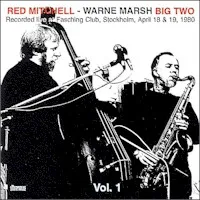In the 1950s, critics talked of East and West coast jazz. It was a way of playing the racial card, with East coast representing black, played from the gut; while West was white, played from the mind. As far as the dogmatists were concerned: East good, West bad. The word "cerebral" became a term of abuse. No group of musicians was more cerebral than the one centered around Lennie Tristano, a pianist and teacher, based awkwardly in New York. To make things even more awkward, before his arrival in the Big Apple, Tristano had led his own Dixieland outfit in his native Chicago, and played tenor saxophone and clarinet in a rhumba band. He was outspoken and unafraid of controversy. His stated aim was to expand the harmonic horizons of jazz. Lee Konitz was the best known Tristano disciple. Tenor saxophonist Warne Marsh another.
Marsh met bassist Red Mitchell in New York in 1946, introducing him to Tristano and his ideas. They next got together on the West Coast in 1952 and by 1957, Mitchell was playing as part of a Marsh-led quartet that also featured pianist Ronnie Ball and drummer Stan Levey. Then Mitchell found himself at odds with American foreign policy, most notably on Vietnam, and he moved to Sweden in 1968.It wasn't until the late 1970s that he began returning to the States and met up, once again, with Marsh. They started playing as a duo, something that had considerable rarity value. They played a week-long gig at Sweet Basil in New York and were featured on National Public Radio. As a result of this, Mitchell secured them an engagement at Fasching, the leading modern jazz club in Stockholm, the Swedish capital, where the 22 tracks on this double-CD were recorded on April 18-19, 1980.
The collection opens, appropriately, with Lennie Tristano's "317 East 32nd Street," which the pianist constructed out of the changes of the old standard "Out of Nowhere." But, as if to refute looming accusations of cerebralism, it continues with "South American Way," a song forever associated with camp "Brazilian Bombshell" Carmen Miranda. Throughout, Mitchell pushes the melodic limitations of his instrument, which he tuned in fifths, like a violin. On occasion he almost makes it sing, while still keeping perfect time. Perhaps the most cerebral number is the old warhorse "Lady Be Good," on which Marsh recreates, note-for-note from memory, the solo Lester Young played on his 1936 recording. (Tristano encouraged pupils to sing solos by Young and other jazz greats, while Marsh was a member of the original version of Supersax, which orchestrated Charlie Parker's solos note-for-note. No doubt a cerebral dead end, but interesting nonetheless.) Most of the compositions are taken from The Great American Songbook, others are bebop classics based on the chord changes of standards. Funky it ain't but swing it does, with great taste and subtlety as well as some superb improvisations. ~Chris Mosey

Album: Big Two (Disc 1)
Bitrate: MP3@320K/s
Time: 54:39
Size: 125.1 MB
Styles: Saxophone jazz
Year: 2009
Art: Front
[4:40] 1. 317 East 32nd Street
[4:09] 2. South American Way
[5:07] 3. Star Eyes
[4:41] 4. Oh, Lady Be Good
[4:29] 5. It's You Or No One
[5:44] 6. These Foolish Things
[5:28] 7. In A Mellow Tone
[4:09] 8. Just You, Just Me
[6:05] 9. You Stepped Out Of A Dream
[5:28] 10. Embraceable You
[4:34] 11. Little Willie Leaps
Big Two (Disc 1)
Album: Big Two (Disc 2)
Bitrate: MP3@320K/s
Time: 56:22
Size: 129.0 MB
Styles: Saxophone jazz
Year: 2009
Art: Front
[4:24] 1. Hot House
[5:08] 2. Undertow
[7:07] 3. Lover Man
[4:25] 4. Tea For Two
[4:07] 5. Gone With The Wind
[5:15] 6. Ornithology
[4:42] 7. It Could Happen To You
[7:07] 8. Easy Living
[4:24] 9. I'm Getting Sentimental Over You
[4:53] 10. Background Music
[4:44] 11. Scrapple From The Apple
Big Two (Disc 2)










